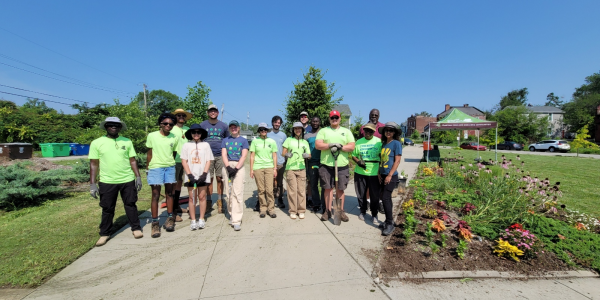A Center for the Humanities internship pairs doctoral students with St. Louis nonprofits, applying humanistic thinking beyond campus.

As graduation approached, Sewasew Assefa seemed set on a familiar path. With a new PhD in anthropology, she aimed for academia and even landed a postdoctoral position after she defended her dissertation in August. But a summer internship opened her eyes to possibilities beyond the academy, reshaping how she imagined her future.
Humanities@Work, a hands-on summer internship program for graduate students, is sponsored by the Center for the Humanities and was initially funded for three years by the National Endowment for the Humanities.
This summer, the program placed seven interns with five mission-driven nonprofits focused on the arts, environmental justice, and community building. The program helps students build professional skills and offers a stipend while also giving partner organizations access to the unique expertise and perspectives humanities scholars bring. Stephanie Kirk, director of the Center for the Humanities, envisioned the program as a way to prepare students for an evolving professional landscape.
Assefa, an archaeologist exploring diet and health in ancient East Africa, found a natural home at the Griot Museum of Black History in St. Louis, which preserves and shares the stories of the Black diaspora. During her internship, she processed archival materials from a newly donated collection and helped plan community events, including the museum’s Juneteenth celebration. Her impact was immediate. Her supervisor Lois Conley offered her a full-time position, which Assefa accepted instead of the postdoctoral role at another university.
For Assefa, the work resonated deeply. Her research in Kenya connected to the museum’s mission of preserving African American histories, and as a pan-Africanist trained as a “four-field” anthropologist at WashU — covering archaeology, cultural anthropology, linguistics, and biological anthropology — she brought both expertise and perspective to the role.
“In cultural anthropology, you’re trained to create a rapport and establish relationships, which is something that happens every day at the museum when we try to engage new people,” she said. “And as an archeologist, I’m also trained to have a time depth perspective, not just in the niche of the current time period, but understanding both the historical perspective and current context.”
Meredith Kelling, an assistant director of student research and engagement at the Center for the Humanities and director of the internship program, said the Center has long aimed to broaden the conversation about career paths for humanities doctorates.
“Although it’s not traditionally part of doctoral training, it’s important to expand our sense of what a humanities PhD can contribute beyond academia,” Kelling said. “There’s tremendous intellectual value in stepping into the community to help address complex problems — doctoral students’ skills and expertise are suited to that work.”
The Center for the Humanities envisions humanities-trained students pursuing careers in fields such as media, museums, start-ups, health care, nonprofits, government, law, film and theater, social justice organizations, management consulting, and beyond.
Bailey Willden experienced this firsthand during her Humanities@Work internship at Forest ReLeaf. A fourth-year PhD candidate in Hispanic studies, she developed a curriculum on ecological justice for high school students and contributed to a seed collection initiative encouraging rural landowners to donate seeds for urban tree planting. Her work aligned closely with her research, as many of the indigenous communities she studies hold deep-rooted beliefs in maintaining a healthy ecosystem and embrace a social justice–oriented approach to conservation.

Willden valued the professional development built into the internship, which began in the spring semester, before students even applied for summer positions. The Center held seminars on how to write a non-academic résumé and prepare for an interview with a community organization.
“The program offered detailed, specific, and concrete professional training that we in the humanities don’t always get,” she said. “We also got to learn so much, not just from people in the WashU community, but also the wider St. Louis community. I feel a lot more connected to the place where I live than I did before.”
The program, initially a three-year pilot, is now at risk because of federal funding cuts earlier in the year. Its grant was rescinded without explanation along with more than 1,000 others that had been awarded by the National Endowment for the Humanities. The Center has a history of implementing programming to support more holistic and innovative training for grads, including Mellon Foundation–funded grant, “Redefining Graduate Education in the Humanities (RDE),” and an NEH-funded “Next Generation” grant.
Recognizing the impact of the Humanities@Work internship, the Center is actively seeking new funding to keep the program alive after its initial support ended. Kirk, who is also a professor of Spanish, comparative literature, and women, gender, and sexuality studies, is optimistic. By working directly with local organizations, students learn, but they also lead, she explained. “These internships bring the power of the humanities into the heart of our community,” she said. “Students tackle real challenges, communicate with purpose, think strategically, and collaborate to create meaningful change. This is the humanities in action: thoughtful, relevant, and shaping the world beyond academia.”





